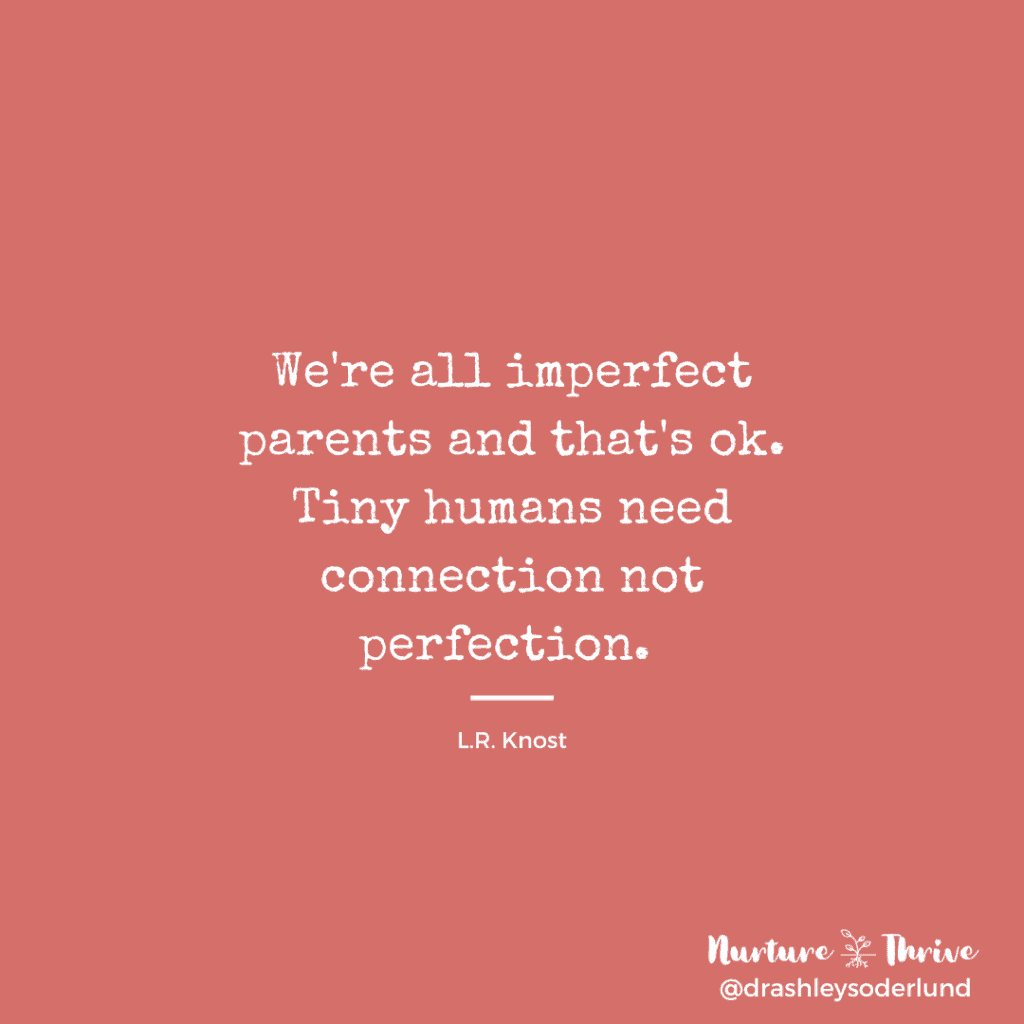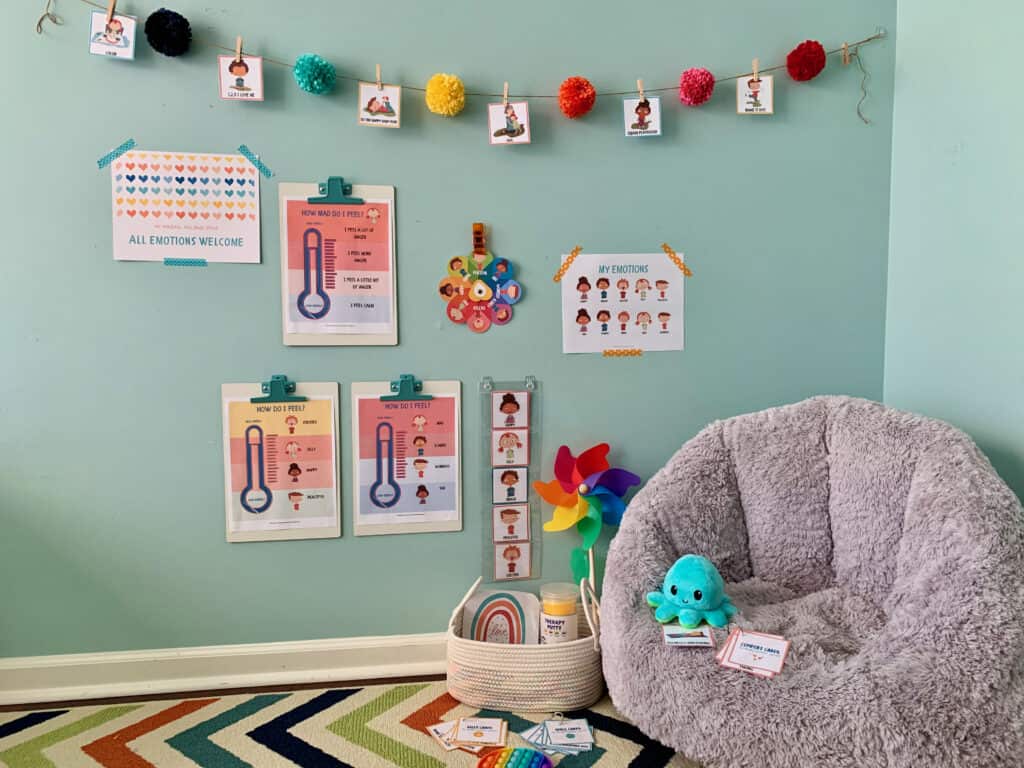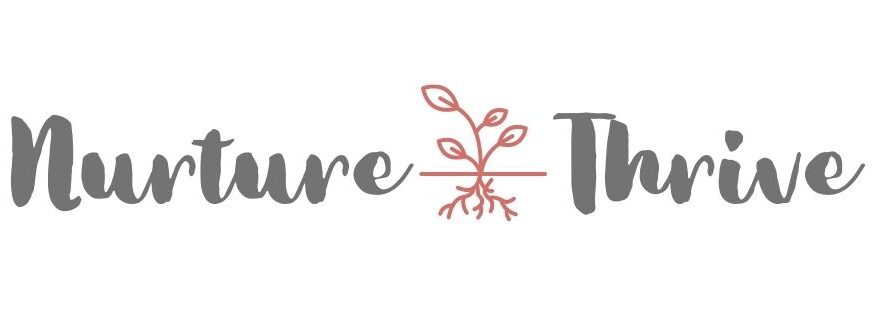Inside: 50 parenting quotes for those really hard parenting moments to remind you to not be too hard on yourself or your child.
Parenthood is perhaps one of the hardest roles we will have in our lives. Maybe it is because while our child is growing, we are growing too- all of those transitions and changes mean a lot of reflection and adaptation.
Often, when parenting is really hard, it is because we are so immersed in it — the dishes, the laundry, the big unregulated emotions from our children whose brains are still growing — that it is near impossible to take a broader view.
Yet, it is that exact ability- to take a broader view- to shift your perspective- that makes all the difference in how we experience parenting and how we react or consciously respond.
For more quotes, follow Nurture and Thrive on Instagram and find weekly inspiration!

Instead of questioning the way we handle things (and feeling guilty), what if we looked at those moments as our children showing us where we need to grow—raising us up. What a gift that would be.
Ashley Soderlund, Ph.D.
What if we looked at those moments when we feel challenged by our kids as opportunities to grow? Research shows that there are increases in gray matter volume in the prefrontal cortex, parietal lobes, and midbrain areas in mothers postpartum. This newly developed “parental” brain is thought to help us respond to infant cues.
When we become a parent, our brains change.
When our child is born, we are born as parents.
This is a new role, and newly developed parts of our brain come with it. And we must be gentle with ourselves. We are not born knowing everything we know to be good parents. We are learning and growing right alongside our kids. Read more about brain changes after having a child here.
Here are a few more quotes about this crazy role of parent!
As your kids grow, they may forget what you said, but won’t forget how you made them feel.
Kevin Heath
Children can face all sorts of difficulties and challenges if they can come back to the well of our unconditional love.
Mary and Jon Kabat-Zinnt
At the end of the day, the most overwhelming key to a child’s success is the positive involvement of the parents.
Jane D. Hall
The point of parenting is not to have all of the answers before we start out but instead to figure it out on the go as our children grow. Because as they do, so will we.
Bridgett Miller

There is no such thing as a perfect parent so just be a real one.
Sue Atkins
Our kids don’t need us to be perfect Pinterest parents — they just need us as we are.
It’s really as simple as that. Our consistent presence in their lives, the ability to say sorry when we mess up, and to simply be there.
Here are some more quotes about being a “real” parent:
Parenting shouldn’t feel like a competative sport, It’s plenty challenging without any added obstacles. Strive to be loving and kind; have the courage to ask for help; take a break when you need it; celebafte all the great stuff; be kind to yourself, and be yourself. That’s who your kid loves anyway.
Ariadne Brill
Being a parent can be tough, but remember in your child’s eye nobody does it better than you.
Unknown
What if we realized that we don’t need to be an all-singing, all-dancing super parent to be a good parent? By placing less presssure on ourselves and our little ones, and giving them the space to blossom, we can all find greater balance.
Niki Brantmark
There’s no way to be a perfect mother and a million ways to be a good one.
Jill Churchill

You don’t have to be perfect. We’re all going to mess up at times. We’re all going to be fearful, we’re going to be grumpy. Just repair and move on.
Tina Payne Bryson, Ph.D.
As parents, we are bound to lose our cool with our kids at some point. When we lose our temper, it often has more to do with us than with them — our triggers, inner voice, and emotional baggage.
Research on attachment and interpersonal relationships shows that it isn’t about losing your temper that defines a relationship — it’s about the repair.
What you do after you yell is one of the most critical things you can do as a parent.
Own it and apologize. Repair and move on. Read more about the steps to take when you lose your temper or what to say after you yell at your child here.
The moment we realise that how we react to our kids behavior has more to do with how we’re feeling that what our kids are doing, is the moment we understand that our main job as parents must be to keep ourselves emotionally healthy.
Respectful Mom
To support a child emotionally, acknolwedge your own emotional needs and reinforce self-care by practicing it. Your child will learn the value of restoration by watching you.
Harold Koplewicz M.D.
Each parenting mistake you make is an opportunity for your child to build mental strength. That doesn’t mean you should go out of your way to speed up his strength-buildng process but it does mean you can give him real-life learning experiences through your own failures.
Amy Morin
Giving grace to yourself is never more important than when you became a mother.
Whitney Meade

We’re all imperfect parents and that’s ok. Tiny humans need connection not perfection.
L.R. Knost
In “The Power of Meaning: Finding Fulfillment in a World Obsessed with Happiness,” Emily Esfahani Smith says that it is a meaningful life rather than a happy one that leads to a true sense of well-being.
Meaning is already there if you look for it — if you are present to see it — it’s there in your everyday moments, in the moments you connect.
It’s in the middle of that rambunctious afternoon when being with your kids is stressful and taxing — you let it all go and have a dance party right there in the living room.
That meaningful life full of connection — it’s already there — you don’t have to go out and do anything, buy anything, or be anything other than what or who you are right now.
An imperfect parent doing her best — looking at her child with open eyes and an open heart and saying yes. Read more about saying yes to childhood here.
When a child can’t calm down they need connection and comfort, not criticism and control.
Jane Evans
Remember that the most important thing is not your child’s behavior. The most important thing is your child. Look beyond behavior and connect with your child.
Issa Waters
When we have a bad day, or we are stressed or sick, we are designed to go towards those who make us feel safe. For children, this is especially true.
Tammy Schamuhn
Before you can correct, you have to connect. Discipline will just make him feel less safe. Play, on the other hand, creates a sense of saftey and releases the connection hormone, oxytocin.
Dr. Laura Markum

Be kind to yourself. And let your kindness flood the world.
Pema Chodron
One of the first things I tell parents who want to be more patient with their kids is to first be more patient with themselves.
Stop yelling at yourself with that inner voice — you know the one.
If you are stressed and tired, acknowledge that to yourself. Tell yourself it’s okay to feel how you feel. Expect that when you look inside yourself that you will see ‘negative emotions.’ That’s the key: Accept yourself and all of your emotions first. Be kind to yourself.
Read more about 10 ways to stop yelling at your kids here.
The way you love your kids now is the exact kind of love they will expect and accept from the world as adults. And how you speak to them is the same way they will speak to themselves. SaveSave
Youth Dynamics
The way we talk to our children becomes their inner voice.
Peggy O’Mara
You can’t teach children to behave better by making them feel worse. When children feel better they behave better.
Pam Leo
The lesson is always love.
Madeline L’Engle

Between stimulus and response, there is a space. In that space lies our freedom and power to choose our response. In our response lies our growth and freedom.
Viktor Frankl
There is such a powerful space between what happens in the world and your reaction to it. That space — that pause — is the key to taking control of your response and your mental space — making your mind a nice place to be.
You and your child will benefit from conscious responses from you instead of automatic reactions. This is the essence of mindful parenting.
Neuroscience research shows that the only ways we can change the way we feel is by becoming aware of our inner expereinces and learning to befriend what is going on inside ourselves.
Bessel van der Kolk M.D.
Mindfulness is the opposite of “losing” your temper. Don’t get me wrong — mindfulness doesn’t mean you don’t feel anger. Being mindful means that you pay attention to what you are feeling, but don’t act on it. Anger is part of all relationships. Acting on it mindlessly, with words or actions, is what compromises our parenting.
Dr. Laura Markum
The most powerful way to change the world is to live in front of our children the way we want the world to be.
Graham B. White
Children must never work for our love. They must rest in it.
Dr. Gordon Neufield

Be the calm you want to see in your child.
Renee Jain
Let’s face it — when it comes to the child-parent relationship, there is one person who has mature self-control and one smaller person with considerably less self-control.
The result is that as a parent, we not only have to regulate ourselves, but we also have to help our kids regulate.
Depending on age, temperament, and what’s going on in their life our kids are not yet well-equipped to handle disappointment, and frustration, be able to calm down, focus on a goal, evaluate options or make well-thought-out decisions.
But we are — we are the ones who can model for our kids how to have emotions, accept them, and move through them. Read more about that here.
Little eyes, ear, and hearts are always watching. Be what you want them to see.
Tracy Nolin Beerman
When little people are overwhelmed by big emotions, it’s our job to share our calm, not to join their chaos.
L.R. Knost
The thing that actually emotionally calms a child is connection.
Sophie Havinghurst
If you want a single reason to be patient with your child when they’re melting down or being unreasonable in some way, this is it: their brain isn’t fully formed yet, and they are, at times, literally incapable of controlling their emotions and their body.
Dr. Dan Siegel and Dr. Tina Payne-Bryson

Do the best you can do until you know better. Then when you know better, do better.
Maya Angelou
Be gentle with yourself as you develop and grow as a parent. We learn from our mistakes — if we allow ourselves to learn. If we beat ourselves up with endless guilt we don’t see how we can grow.
Allow yourself to make mistakes and allow yourself to learn from those mistakes. Open yourself up to doing better the next time around. Open yourself up to growth!
Related Resource: Get Started with Positive Parenting Today: 10 Tips From a Developmental Psychologist
It is not only children who grow. Parents do too. As much as we watch to see what children do with their lives, they are watching us to see what we do with ours. I can’t tell my children to reach for such. All I can do is reach for it myself.
Kay Renfield Jamison
Some days, doing “the best we can” may still fall short of what we would like to be able to do, but life isn’t perfect on any front — and doing what what we can with what we have is the most we should expect of ourselves.
Fred Rodgers
I believe the best way to inspire a quality, or even a habit, in our kids, is to cultivate it in ourselves. This means that parenting is a constant journey of learning and growth, of looking outward, toward my children, to see the areas which I need to work at improving myself.
Hannh Guari Ma
Children do not experience our intentions, no matter how heartfelt. They experience what we manifest in tone and behavior.
Dr. Gordon Neufield

While we try to teach our children about life, our children teach us what life is all about.
Angela Schwindt
When our kids are born, we are reborn as parents. We grow and develop right alongside our children. We are not meant to know everything or how to do everything as a parent, which is okay. Let the guilt go, and instead, let yourself grow and thrive.
Think of the last time your child tried your patience. Talk about a teachable moment, huh? It seems like our kids have a knack for finding our weak spots, which happen to be exactly where we need to grow.
All of those moments where you are checking yourself, regulating, taking a breath– those are your lessons and your chances to grow.
That is not to say we handle those trying situations perfectly (I sure don’t!). But we try to reflect on them and try to learn from them.
What if parenting became less about telling our children who they should be and more about asking them again and again forever who they already are.
Glennon Doyle
Give the ones you love wings to fly, roots to come back, and reasons to stay.
Dalai Lama
Children don’t just need to be loved; They need to know that nothing will change the fact that they’re loved.
Alfie Kohn
It is not our job to toughen our children up to face a cruel and heartless world. It’s our job to raise children who will make the world a little less cruel and heartless.
L.R. Knost

Zen parents aren’t born, self-regulation is not a skill to master or an inherent trait, but rather a journey within ourselves that can always grow, change, and adapt.
Ashley Soderlund, Ph.D.
Just remember, this is a journey, not a destination– one we parents are all on together.
If you see me in the preschool parking lot calmly handling my son’s breakdown, applaud me! If you see me flustered and frazzled, sympathize. I promise I’ll do the same for you.
The sign of great parenting is not the child’s behavior. The sign of truly great parenting is the parent’s behavior.
Andy Smithson
Sometimes we forget that parenting, like love, is a verb.
Jessica Joelle Alexander
One generation of deeply loving parents would chnage the brains of the next generation and with that the world.
Charles Ralston
Don’t make any parenting decisions when you are feeling angry, as anger clouds your judgment. When in doubt, ask yourself, “What would love do?”
Carolina King
What to do next…
1. Get advice from Dr. Ashley Soderlund sent right to your inbox. ❤︎
When you sign up you will get Dr. Ashley’s 5-part Mindful Parent Quick Win Series. These quick wins are designed to get you started implementing some strategies that are rooted in love and backed by science.
After that, you will receive emails when Dr. Ashley has new resources and seasonal series like back-to-school mental health, and holiday gratitude series.
2. Emotional and mental wellness begins at home.
Get the tools you need in my shop! Digital printables you can instantly download and print to foster connection, emotion regulation, and more! Check out the Nurture and Thrive Shop.


 4 Things to Do After Yelling at Your Child: How to Repair
4 Things to Do After Yelling at Your Child: How to Repair